北师大版(2019)必修 第二册Unit 5 Humans and nature Lesson 3 Race to the Pole公开课课件(共56张PPT)
文档属性
| 名称 | 北师大版(2019)必修 第二册Unit 5 Humans and nature Lesson 3 Race to the Pole公开课课件(共56张PPT) |
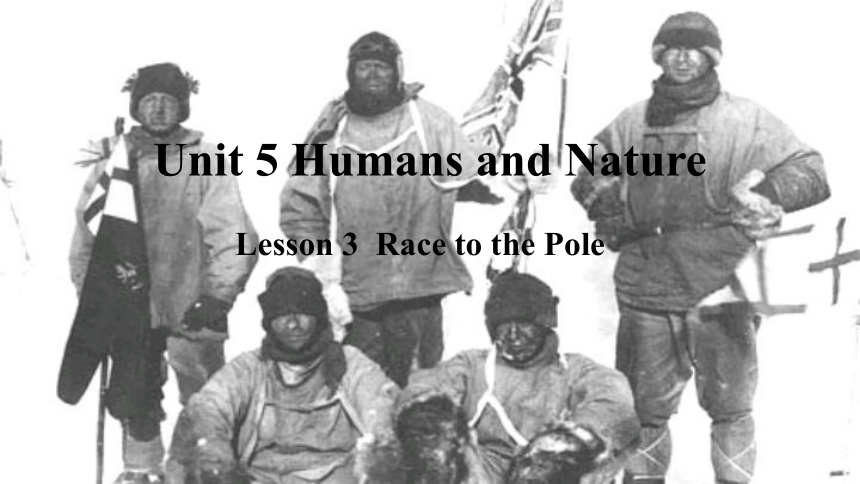
|
|
| 格式 | pptx | ||
| 文件大小 | 2.1MB | ||
| 资源类型 | 教案 | ||
| 版本资源 | 北师大版(2019) | ||
| 科目 | 英语 | ||
| 更新时间 | 2023-03-07 17:26:27 | ||
图片预览

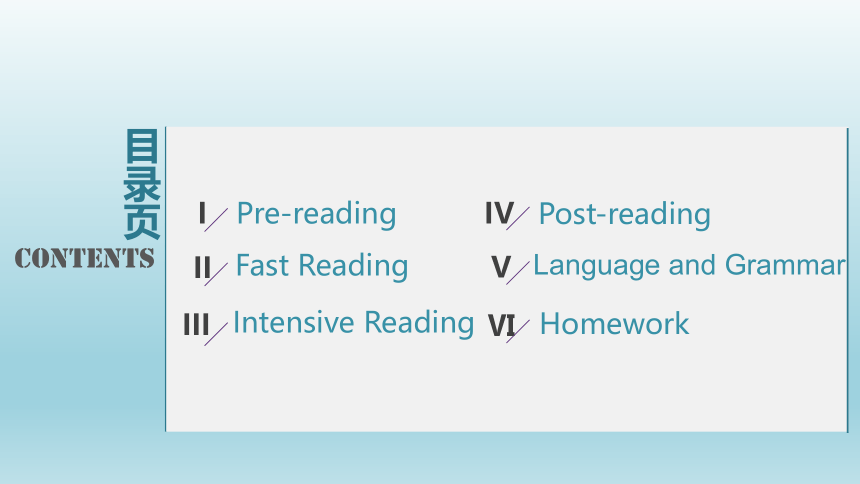


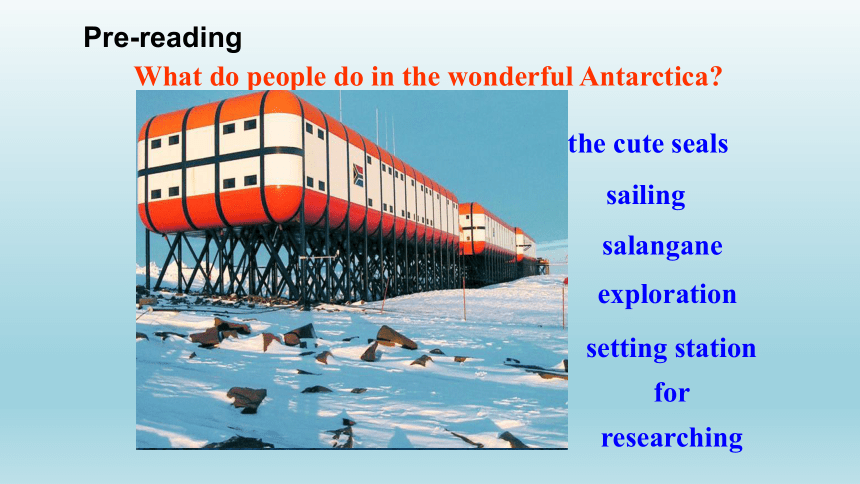
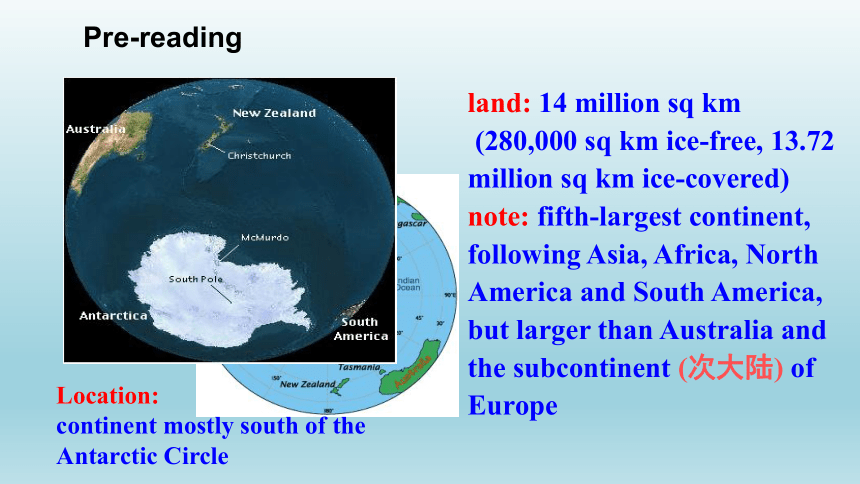
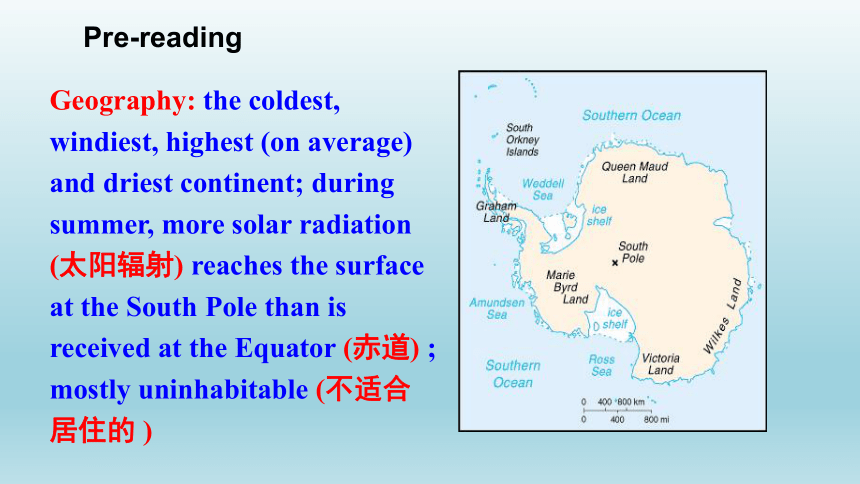
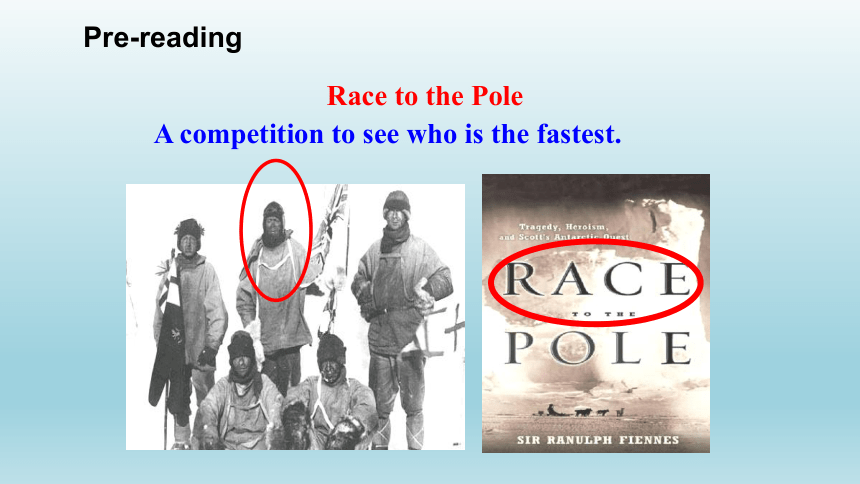
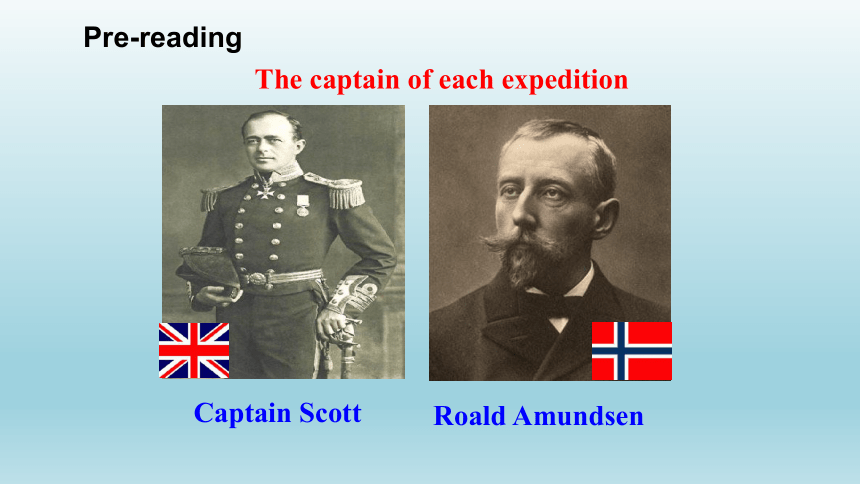
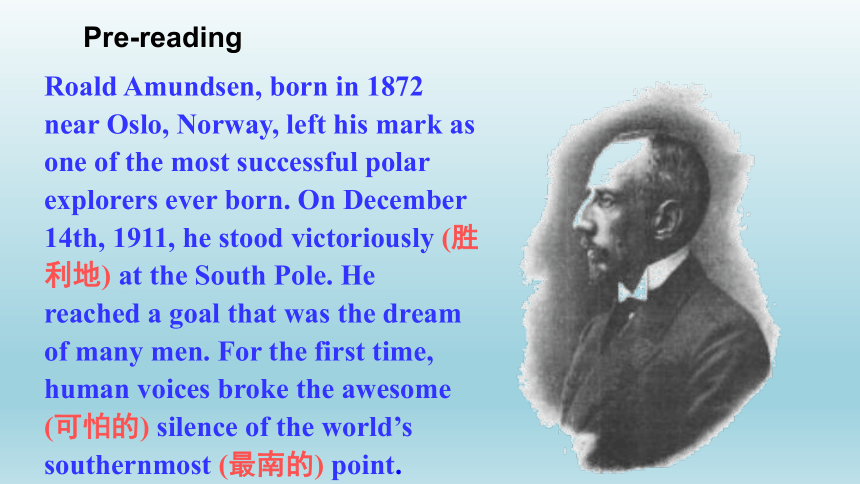
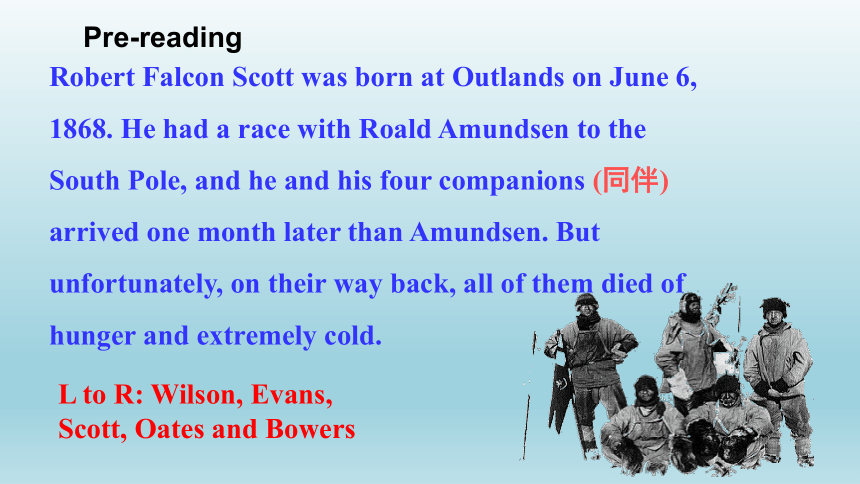

文档简介
(共56张PPT)
Unit 5 Humans and Nature
Lesson 3 Race to the Pole
目录页
contents
Pre-reading
I
Post-reading
IV
Fast Reading
II
Language and Grammar
V
III
Intensive Reading
Ⅵ
Homework
Ⅰ
Pre-reading
Pre-reading
1. What do you know about Antarctica
2. Exploring Antarctica.
(1) If you are going to explore Antarctica, what difficulties do you think you may face there
(2) What preparations do you need to make
Pre-reading
the cute seals
salangane
What do people do in the wonderful Antarctica
sailing
exploration
setting station
for
researching
Pre-reading
Location:
continent mostly south of the Antarctic Circle
land: 14 million sq km
(280,000 sq km ice-free, 13.72 million sq km ice-covered)
note: fifth-largest continent, following Asia, Africa, North
America and South America, but larger than Australia and the subcontinent (次大陆) of Europe
Pre-reading
Geography: the coldest, windiest, highest (on average)
and driest continent; during summer, more solar radiation (太阳辐射) reaches the surface at the South Pole than is received at the Equator (赤道) ; mostly uninhabitable (不适合居住的 )
Pre-reading
A competition to see who is the fastest.
Race to the Pole
Pre-reading
The captain of each expedition
Captain Scott
Roald Amundsen
Pre-reading
Roald Amundsen, born in 1872 near Oslo, Norway, left his mark as one of the most successful polar explorers ever born. On December 14th, 1911, he stood victoriously (胜利地) at the South Pole. He reached a goal that was the dream of many men. For the first time, human voices broke the awesome (可怕的) silence of the world’s southernmost (最南的) point.
Pre-reading
L to R: Wilson, Evans,
Scott, Oates and Bowers
Robert Falcon Scott was born at Outlands on June 6,
1868. He had a race with Roald Amundsen to the
South Pole, and he and his four companions (同伴)
arrived one month later than Amundsen. But unfortunately, on their way back, all of them died of
hunger and extremely cold.
Ⅱ
Fast Reading
Task 1
Fast Reading: Journey to Antarctica
(1) Match the topic with each part:
Part 1 (Para 1 — Para 5) The return journey
Part 2 (Para 6 — Para 10) Race to the South Pole
Part 3 (Para 11) Scott and his men as heroes
Task 2
Fast Reading: Journey to Antarctica
(2) The author quoted Scott’s words in order to make the article__________.
A. better-known B. better-organized
C. more persuasive D. more interesting
(3) What’s the writer’s attitude towards Captain Scott and his team
A. He is mildly critical. B. He is strongly critical.
C. He is in favour of them. D. His attitude is not clear.
Ⅲ
Intensive Reading
Intensive Reading
The race to_______________ Who
When to start
How about the starting journey
When did they finish the journey
What’s the result
Antarctica
Captain Scott
Roald Amundsen
8 September, 1911
1 November, 1911
Made rapid progress
Had problems, sledges broke down, horses had difficulties with the snow and the cold
14 December
17 January
First
Second
Intensive Reading: The Return Journey
(1) The process of their return journey:
Their first hopeless situation: The men were_____________ and the weather conditions were ________.
Then came a disaster: Edgar Evans
______________________________________.
Another disaster: Captain Oates
__________________________________.
The last disaster: Scott and his members couldn’t leave
because______________________________.
The ending of the return journey:_______________________
soon very tired
terrible
had great difficulty walking and died
a terrible storm started
had a terrible disease and died after a bad fall
Scott died and failed to win
____________________
the race to the Pole
Intensive Reading: The Return Journey
(2) What did Scott’s team achieve
A. They became rich for their trip.
B. They got nothing but pity.
C. They became the first to reach the Pole.
D. They collected rocks that proved Antarctica had once been covered by plants.
Intensive Reading: The Return Journey
(3) Why was the return journey one of the worst in the history of exploration
A. All team members were very tired and were running out of food.
B. The weather conditions became terrible.
C. Two of the team had terrible disease and the rest met with a terrible storm and couldn’t leave the tent till they died.
D. All of the above.
Intensive Reading: The Return Journey
(4) What made Scott’s team into heroes
A. Their braveness, perseverance and the extraordinary courage moved the world.
B. They collected valuable stones.
C. They died for the expedition.
D. They made great contribution to the world.
Ⅳ
Post-reading
Post-reading
Read the underlined sentences from Scott’s diary and letter. Work out the implied meaning of these sentences from the context. Write your inferences below.
line 21 ___________________________________________________________
line 26 ____________________________________________
line 33 ____________________________________________
line 42 ___________________________________________________________
They lost the reason for the journey.
The men were getting weaker.
He is going to walk into the cold and die away from the team.
The journey cost the men their lives.
Post-reading
(1) Would you say that Scott and his team were losers Why
or why not
(2) How do you understand Amundsen’s saying about Scott’s death “Captain Scott left a record, for honesty, sincerity, for bravery, for everything that makes a man”
Group Work: Think and share.
Post-reading
(1) Would you say that Scott and his team were losers Why
or why not
Even though Scott and his team lost the race to the Pole, they showed true determination and strength of character which is seen in heroes. Scott and his team are inspirational and not losers. Scott’s team had always kept their goals in mind. They carried the rocks even in extremely difficult situations. The spirit and what they have done helped followers do further research.
Group Work: Think and share.
Post-reading
(2) How do you understand Amundsen’s saying about Scott’s death “Captain Scott left a record, for honesty, sincerity, for bravery, for everything that makes a man”
Group Work: Think and share.
Captain Scott wrote a diary detailing his journey, each entry was truthful and honest. He was honest about the feelings of his team and his fears. Captain Scott and his team brought back rocks for research. They did not only think about themselves but also about the greater good of humankind and the effect of the research.
Ⅴ
Language and Grammar
Focus on Language: Important words and phrases
Find the following words and phrases in the passage, and work out their meanings.
1. 收到……的短信
2. 向……进发的竞赛开始
3. 食物储备
4. 在为……做准备
5. 极地冬夜
6. 第一个做……
______________________________________
receive messages from …
the race to … began
food bases
in preparation for …
the total darkness of the polar winter
the first to do …
______________________________________
______________________________________
______________________________________
______________________________________
______________________________________
______________________________________
Focus on Language: Important words and phrases
Find the following words and phrases in the passage, and work out their meanings.
7. 拉雪橇
8. 前进速度很快
9. 遇到……的麻烦
10. 准备回程
11. 感到震惊
12. 雄伟目标
______________________________________
pull the sledges
make rapid progress
have serious difficulties with …
prepare for the return journey
be shocked
goal of ambition
______________________________________
______________________________________
______________________________________
______________________________________
Focus on Language: Important words and phrases
Find the following words and phrases in the passage, and work out their meanings.
13. 探险史
14. 食物短缺
15. 天气状况
16. 绝望境地
17. 感到愉快
______________________________________
history of exploration
run out of food
weather conditions
hopeless situation
be cheerful
______________________________________
______________________________________
______________________________________
______________________________________
Focus on Language: Important words and phrases
Find the following words and phrases in the passage, and work out their meanings.
18. 在返程途中
19. 某人一路带回了……
20. 证实……
21. 在遥远的过去
22. 一度
______________________________________
on one’s way back
carry … all the way with sb.
prove that …
in the distant past
at one time
______________________________________
______________________________________
______________________________________
______________________________________
Focus on Language: Important words and phrases
Find the following words and phrases in the passage, and work out their meanings.
23. 行走艰难
24. 走向死亡
25. ……的举动
26. 继续行进
27. 用某人最后的时间 做……
______________________________________
have great difficulty walking
walk to one’s death
it is the act of …
carry on
spend some of one’s last hours doing …
______________________________________
______________________________________
______________________________________
______________________________________
Focus on Language: Important words and phrases
Find the following words and phrases in the passage, and work out their meanings.
28. 一封充满悲伤的信
29. 付出了多大的代价啊!
30. 震惊了世界
______________________________________
a letter full of sadness
What a price to pay!
shock the world
______________________________________
______________________________________
1. On his way,he received a message from…
英译汉:__________________________________________
on one’s way 在途中
on one’s way home 在某人回家的途中
Focus on Language: Difficult sentences
在途中,他收到了来自……的信息。
2. During the polar summer of 1910 — 1911, both teams
organised food bases in preparation for their journeys the next year.
英译汉:__________________________________________
in preparation for … 在为……做准备
make preparations for 为……做准备
Focus on Language: Difficult sentences
在1910年到1911年的极地夏天,两队进行了食物储备为下一年的旅程做准备。
英译汉:__________________________________________
3. First, his two sledges broke down, and then the horses began to have serious difficulties with the snow and the cold.
Her health broke down under the pressure of work. 她因工作压力身体_____。
But earthquakes do not break down our Chinese heart.
但地震_______我们的中国心。
Focus on Language: Difficult sentences
垮掉了
打不垮
先是他的两辆雪橇坏了,后来马匹开始在大雪和严寒的天气下出现严重的问题。
4. The next to go was Captain Oates, who was having great difficulty walking.
英译汉:__________________________________________
have a lot of / much / little / no difficulty (in) doing sth.
某人做某事很费劲/不费劲
Focus on Language: Difficult sentences
接下来离开的是奥茨上校,他走路很困难。
英译汉:__________________________________________
5. They were shocked when they saw the Norwegian flag.
shocked adj. 感到吃惊的;感到惊讶的
shocking adj. 令人气愤的;令人憎恶的
be shocked at / by (doing) sth. 因(做)某事被震惊
Focus on Language: Difficult sentences
shock vt. 使震惊;使难以置信 n. 打击;震惊;震动;休克
当他们看到挪威国旗时,感到很震惊。
6. The men were soon very tired and were running out of food.
英译汉:__________________________________________
Focus on Language: Difficult sentences
这些人很快就精疲力竭了,食物也快吃完了。
run out of = use up 用完;耗尽
The petrol is running out.
= We are running out of the petrol. 汽油快用光了。
Focus on Language: Difficult sentences
拓展
sb. runs out of sth. 某人用光某物
sth. runs out 某物即将用完
sb. uses up sth. 某人用光某物
sth. is used up 某物被用光
sth. gives out 某物用完
7. Later, these rocks proved that at one time in the distant past the continent of Antarctica was covered by plants.
英译汉:__________________________________________
Focus on Language: Difficult sentences
后来,这些石块证明在遥远的过去南极洲曾被植物覆盖。
at one time 曾经有一个时期;一度
Focus on Language: Difficult sentences
at a time
at the time
at all times
at times
at other times
at no time
in no time
一次;逐一;每次
当时;在那时
随时;总是
有时;间或
在其他时候
决不;在任何时候都不
立刻;马上
拓展
8. Scott and two of his team members carried on and got within eleven miles of one of their food bases.
英译汉:__________________________________________
Focus on Language: Difficult sentences
斯科特和他的两位团队成员继续向前,到达距离食品储存处不足十一英里的地方。
carry on 继续走;继续行进
Focus on Language: Difficult sentences
carry on doing / with sth. 继续做某事
carry out 实行 / 执行;完成
carry away 带走;使失去自控力
carry sb. / sth. through 使渡过难关;完成 / 实现
carry off 赢得;获得
拓展
1. 名词后缀
1) -or / er / ess / crat / cis表示“做某件事情或职业的人或物”:worker, debtor
2) -acy表示“性质,状态,境遇”:democracy, accuracy, diplomacy
3) -ance, -ence表示“性质,状况,行为,过程,总量,程度”:importance, diligence, difference, obedience
4) -ancy, -ency表示“性质,状态,行为,过程”:frequency, urgency, efficiency
Focus on Grammar: 后缀
1. 名词后缀
5) -bility表示“动作,性质,状态”:possibility, flexibility, feasibility
6) -dom表示“等级,领域,状态”: freedom, kingdom, wisdom
7) -age: package, shortage, marriage
8) -ant: assistant, accountant, inhabitant
Focus on Grammar: 后缀
1. 名词后缀
9) -hood表示“资格,身份, 年纪,状态”:childhood, manhood, falsehood
10) -ion, -sion, -tion, -ation, -ition表示“行为的过程,结果,状况”:action, solution, conclusion, destruction, expression, correction
11) -ism表示“制度,主义,学说,信仰,行为”:socialism, criticism, colloquialism, heroism
Focus on Grammar: 后缀
1. 名词后缀
12) -ty表示“性质,状态,程度”:purity, reality, ability, loyalty, identity
13) -ment表示“行为,状态,过程,手段及其结果 ” :treatment, movement, judgment, punishment, argument
14) -ness表示“性质,状态,程度”: goodness, kindness, tiredness, friendliness
15) -cy: bankruptcy, literacy, democracy
Focus on Grammar: 后缀
1. 名词后缀
16) -ship表示“情况,性质,技巧,技能及身份,职业”: hardship, membership, friendship
17) -th表示“动作,性质,过程,状态”:depth, wealth, truth, length, growth
18) -tude表示“性质,状态,程度”:latitude, altitude (海拔)
19) -ure表示“行为,结果”:exposure, pressure, failure, procedure (手续)
Focus on Grammar: 后缀
1. 名词后缀
20) -grapy表示“……学,写法”:biography, calligraphy, geography
21) -ic, ics表示“……学,……法”:logic, mechanics, electronics, linguistics
22) -ology表示“……学,……论”:biology, zoology, technology (工艺学)
23) -nomy表示“……学,……术”:astronomy, economy, bionomy (生态学)
Focus on Grammar: 后缀
2. 形容词后缀
带有“属性,倾向,相关”的含义
1) -able, -ible: visible, flexible
2) 名词 + -ish: foolish, bookish, selfish
(注意accomplish, vanish)
3) -ive: active, sensitive, productive
4) -like: manlike, childlike
5) 名词 + -ly: manly, fatherly, scholarly, motherly
6) -ory: satisfactory, illusory
7) -ic: realistic, specific, poetic, energetic
8) -ical: physical, classical, economical
Focus on Grammar: 后缀
2. 形容词后缀
9) -some: troublesome, handsome
10) -ful: beautiful, wonderful, helpful, truthful
11) -ous: dangerous, generous, courageous
12) -ent: violent
13) -most: foremost, topmost
14) -less (表示否定):countless, stainless, wireless
15) -al: personal, internal, critical, accidental
16) -ary: necessary, primary, secondary
17) -ious: religious, furious, precious
18) -y: dirty, healthy, rainy, thirsty, sunny
Focus on Grammar: 后缀
3. 动词后缀
1) -ize, ise表示“做成,变成,……化” : modernize, mechanize, democratize, organize
2) -en表示“使成为,引起,使有” : quicken, weaken, soften, harden
3) -fy表示“使……化, 使成” : beautify, purify, intensify, signify, simplify
4) -ish表示“使,令”: finish, abolish, diminish, establish
5) -ate表示“成为……,处理,作用” : separate, operate, indicate
Focus on Grammar: 后缀
4. 副词后缀
形容词 + -ly:bad → badly 严重地 / 恶劣地
careful → carefully小心地
2) -wise:clock → clockwise (adj. / adv.) 顺时针方向的(地); like → likewise同样地
3) -ward(s):out → outwards 向外面地,north → northwards向北方地
Focus on Grammar: 后缀
VI
Homework
Writing
Homework
结合本单元句型,并运用部分重要词组,如
turn up, have difficulty (in) doing, fail to do, back out, as
well as, in order to, too…to…, be worth doing等,
表达以下我的经历:
我第一次参加英语演讲比赛时很紧张以至于不知
说什么。我无法集中思想,准备放弃。但是,老师的
笑脸和观众的热烈掌声鼓励了我。我先整理思路,然
后深呼吸以便保持冷静。虽然我没有得到名次,但我
被授予一个特别勇气奖。这让我一时难以相信。
这一天难道不值得庆祝吗?
Homework
When I turned up for my first English speech contest, I was so nervous that I had great difficulty coming up with the words. I failed to concentrate and was about to back out. However, I was greatly encouraged by my teacher’s smiling face, as well as the audience’s warm applause. First, I collected my thought and then I took a deep breath in order to stay calm. Although I was not the winner, I was awarded a special prize of courage, which I thought was too good to be true at that moment.
It was really worth celebrating, wasn’t it
Unit 5 Humans and Nature
Lesson 3 Race to the Pole
目录页
contents
Pre-reading
I
Post-reading
IV
Fast Reading
II
Language and Grammar
V
III
Intensive Reading
Ⅵ
Homework
Ⅰ
Pre-reading
Pre-reading
1. What do you know about Antarctica
2. Exploring Antarctica.
(1) If you are going to explore Antarctica, what difficulties do you think you may face there
(2) What preparations do you need to make
Pre-reading
the cute seals
salangane
What do people do in the wonderful Antarctica
sailing
exploration
setting station
for
researching
Pre-reading
Location:
continent mostly south of the Antarctic Circle
land: 14 million sq km
(280,000 sq km ice-free, 13.72 million sq km ice-covered)
note: fifth-largest continent, following Asia, Africa, North
America and South America, but larger than Australia and the subcontinent (次大陆) of Europe
Pre-reading
Geography: the coldest, windiest, highest (on average)
and driest continent; during summer, more solar radiation (太阳辐射) reaches the surface at the South Pole than is received at the Equator (赤道) ; mostly uninhabitable (不适合居住的 )
Pre-reading
A competition to see who is the fastest.
Race to the Pole
Pre-reading
The captain of each expedition
Captain Scott
Roald Amundsen
Pre-reading
Roald Amundsen, born in 1872 near Oslo, Norway, left his mark as one of the most successful polar explorers ever born. On December 14th, 1911, he stood victoriously (胜利地) at the South Pole. He reached a goal that was the dream of many men. For the first time, human voices broke the awesome (可怕的) silence of the world’s southernmost (最南的) point.
Pre-reading
L to R: Wilson, Evans,
Scott, Oates and Bowers
Robert Falcon Scott was born at Outlands on June 6,
1868. He had a race with Roald Amundsen to the
South Pole, and he and his four companions (同伴)
arrived one month later than Amundsen. But unfortunately, on their way back, all of them died of
hunger and extremely cold.
Ⅱ
Fast Reading
Task 1
Fast Reading: Journey to Antarctica
(1) Match the topic with each part:
Part 1 (Para 1 — Para 5) The return journey
Part 2 (Para 6 — Para 10) Race to the South Pole
Part 3 (Para 11) Scott and his men as heroes
Task 2
Fast Reading: Journey to Antarctica
(2) The author quoted Scott’s words in order to make the article__________.
A. better-known B. better-organized
C. more persuasive D. more interesting
(3) What’s the writer’s attitude towards Captain Scott and his team
A. He is mildly critical. B. He is strongly critical.
C. He is in favour of them. D. His attitude is not clear.
Ⅲ
Intensive Reading
Intensive Reading
The race to_______________ Who
When to start
How about the starting journey
When did they finish the journey
What’s the result
Antarctica
Captain Scott
Roald Amundsen
8 September, 1911
1 November, 1911
Made rapid progress
Had problems, sledges broke down, horses had difficulties with the snow and the cold
14 December
17 January
First
Second
Intensive Reading: The Return Journey
(1) The process of their return journey:
Their first hopeless situation: The men were_____________ and the weather conditions were ________.
Then came a disaster: Edgar Evans
______________________________________.
Another disaster: Captain Oates
__________________________________.
The last disaster: Scott and his members couldn’t leave
because______________________________.
The ending of the return journey:_______________________
soon very tired
terrible
had great difficulty walking and died
a terrible storm started
had a terrible disease and died after a bad fall
Scott died and failed to win
____________________
the race to the Pole
Intensive Reading: The Return Journey
(2) What did Scott’s team achieve
A. They became rich for their trip.
B. They got nothing but pity.
C. They became the first to reach the Pole.
D. They collected rocks that proved Antarctica had once been covered by plants.
Intensive Reading: The Return Journey
(3) Why was the return journey one of the worst in the history of exploration
A. All team members were very tired and were running out of food.
B. The weather conditions became terrible.
C. Two of the team had terrible disease and the rest met with a terrible storm and couldn’t leave the tent till they died.
D. All of the above.
Intensive Reading: The Return Journey
(4) What made Scott’s team into heroes
A. Their braveness, perseverance and the extraordinary courage moved the world.
B. They collected valuable stones.
C. They died for the expedition.
D. They made great contribution to the world.
Ⅳ
Post-reading
Post-reading
Read the underlined sentences from Scott’s diary and letter. Work out the implied meaning of these sentences from the context. Write your inferences below.
line 21 ___________________________________________________________
line 26 ____________________________________________
line 33 ____________________________________________
line 42 ___________________________________________________________
They lost the reason for the journey.
The men were getting weaker.
He is going to walk into the cold and die away from the team.
The journey cost the men their lives.
Post-reading
(1) Would you say that Scott and his team were losers Why
or why not
(2) How do you understand Amundsen’s saying about Scott’s death “Captain Scott left a record, for honesty, sincerity, for bravery, for everything that makes a man”
Group Work: Think and share.
Post-reading
(1) Would you say that Scott and his team were losers Why
or why not
Even though Scott and his team lost the race to the Pole, they showed true determination and strength of character which is seen in heroes. Scott and his team are inspirational and not losers. Scott’s team had always kept their goals in mind. They carried the rocks even in extremely difficult situations. The spirit and what they have done helped followers do further research.
Group Work: Think and share.
Post-reading
(2) How do you understand Amundsen’s saying about Scott’s death “Captain Scott left a record, for honesty, sincerity, for bravery, for everything that makes a man”
Group Work: Think and share.
Captain Scott wrote a diary detailing his journey, each entry was truthful and honest. He was honest about the feelings of his team and his fears. Captain Scott and his team brought back rocks for research. They did not only think about themselves but also about the greater good of humankind and the effect of the research.
Ⅴ
Language and Grammar
Focus on Language: Important words and phrases
Find the following words and phrases in the passage, and work out their meanings.
1. 收到……的短信
2. 向……进发的竞赛开始
3. 食物储备
4. 在为……做准备
5. 极地冬夜
6. 第一个做……
______________________________________
receive messages from …
the race to … began
food bases
in preparation for …
the total darkness of the polar winter
the first to do …
______________________________________
______________________________________
______________________________________
______________________________________
______________________________________
______________________________________
Focus on Language: Important words and phrases
Find the following words and phrases in the passage, and work out their meanings.
7. 拉雪橇
8. 前进速度很快
9. 遇到……的麻烦
10. 准备回程
11. 感到震惊
12. 雄伟目标
______________________________________
pull the sledges
make rapid progress
have serious difficulties with …
prepare for the return journey
be shocked
goal of ambition
______________________________________
______________________________________
______________________________________
______________________________________
Focus on Language: Important words and phrases
Find the following words and phrases in the passage, and work out their meanings.
13. 探险史
14. 食物短缺
15. 天气状况
16. 绝望境地
17. 感到愉快
______________________________________
history of exploration
run out of food
weather conditions
hopeless situation
be cheerful
______________________________________
______________________________________
______________________________________
______________________________________
Focus on Language: Important words and phrases
Find the following words and phrases in the passage, and work out their meanings.
18. 在返程途中
19. 某人一路带回了……
20. 证实……
21. 在遥远的过去
22. 一度
______________________________________
on one’s way back
carry … all the way with sb.
prove that …
in the distant past
at one time
______________________________________
______________________________________
______________________________________
______________________________________
Focus on Language: Important words and phrases
Find the following words and phrases in the passage, and work out their meanings.
23. 行走艰难
24. 走向死亡
25. ……的举动
26. 继续行进
27. 用某人最后的时间 做……
______________________________________
have great difficulty walking
walk to one’s death
it is the act of …
carry on
spend some of one’s last hours doing …
______________________________________
______________________________________
______________________________________
______________________________________
Focus on Language: Important words and phrases
Find the following words and phrases in the passage, and work out their meanings.
28. 一封充满悲伤的信
29. 付出了多大的代价啊!
30. 震惊了世界
______________________________________
a letter full of sadness
What a price to pay!
shock the world
______________________________________
______________________________________
1. On his way,he received a message from…
英译汉:__________________________________________
on one’s way 在途中
on one’s way home 在某人回家的途中
Focus on Language: Difficult sentences
在途中,他收到了来自……的信息。
2. During the polar summer of 1910 — 1911, both teams
organised food bases in preparation for their journeys the next year.
英译汉:__________________________________________
in preparation for … 在为……做准备
make preparations for 为……做准备
Focus on Language: Difficult sentences
在1910年到1911年的极地夏天,两队进行了食物储备为下一年的旅程做准备。
英译汉:__________________________________________
3. First, his two sledges broke down, and then the horses began to have serious difficulties with the snow and the cold.
Her health broke down under the pressure of work. 她因工作压力身体_____。
But earthquakes do not break down our Chinese heart.
但地震_______我们的中国心。
Focus on Language: Difficult sentences
垮掉了
打不垮
先是他的两辆雪橇坏了,后来马匹开始在大雪和严寒的天气下出现严重的问题。
4. The next to go was Captain Oates, who was having great difficulty walking.
英译汉:__________________________________________
have a lot of / much / little / no difficulty (in) doing sth.
某人做某事很费劲/不费劲
Focus on Language: Difficult sentences
接下来离开的是奥茨上校,他走路很困难。
英译汉:__________________________________________
5. They were shocked when they saw the Norwegian flag.
shocked adj. 感到吃惊的;感到惊讶的
shocking adj. 令人气愤的;令人憎恶的
be shocked at / by (doing) sth. 因(做)某事被震惊
Focus on Language: Difficult sentences
shock vt. 使震惊;使难以置信 n. 打击;震惊;震动;休克
当他们看到挪威国旗时,感到很震惊。
6. The men were soon very tired and were running out of food.
英译汉:__________________________________________
Focus on Language: Difficult sentences
这些人很快就精疲力竭了,食物也快吃完了。
run out of = use up 用完;耗尽
The petrol is running out.
= We are running out of the petrol. 汽油快用光了。
Focus on Language: Difficult sentences
拓展
sb. runs out of sth. 某人用光某物
sth. runs out 某物即将用完
sb. uses up sth. 某人用光某物
sth. is used up 某物被用光
sth. gives out 某物用完
7. Later, these rocks proved that at one time in the distant past the continent of Antarctica was covered by plants.
英译汉:__________________________________________
Focus on Language: Difficult sentences
后来,这些石块证明在遥远的过去南极洲曾被植物覆盖。
at one time 曾经有一个时期;一度
Focus on Language: Difficult sentences
at a time
at the time
at all times
at times
at other times
at no time
in no time
一次;逐一;每次
当时;在那时
随时;总是
有时;间或
在其他时候
决不;在任何时候都不
立刻;马上
拓展
8. Scott and two of his team members carried on and got within eleven miles of one of their food bases.
英译汉:__________________________________________
Focus on Language: Difficult sentences
斯科特和他的两位团队成员继续向前,到达距离食品储存处不足十一英里的地方。
carry on 继续走;继续行进
Focus on Language: Difficult sentences
carry on doing / with sth. 继续做某事
carry out 实行 / 执行;完成
carry away 带走;使失去自控力
carry sb. / sth. through 使渡过难关;完成 / 实现
carry off 赢得;获得
拓展
1. 名词后缀
1) -or / er / ess / crat / cis表示“做某件事情或职业的人或物”:worker, debtor
2) -acy表示“性质,状态,境遇”:democracy, accuracy, diplomacy
3) -ance, -ence表示“性质,状况,行为,过程,总量,程度”:importance, diligence, difference, obedience
4) -ancy, -ency表示“性质,状态,行为,过程”:frequency, urgency, efficiency
Focus on Grammar: 后缀
1. 名词后缀
5) -bility表示“动作,性质,状态”:possibility, flexibility, feasibility
6) -dom表示“等级,领域,状态”: freedom, kingdom, wisdom
7) -age: package, shortage, marriage
8) -ant: assistant, accountant, inhabitant
Focus on Grammar: 后缀
1. 名词后缀
9) -hood表示“资格,身份, 年纪,状态”:childhood, manhood, falsehood
10) -ion, -sion, -tion, -ation, -ition表示“行为的过程,结果,状况”:action, solution, conclusion, destruction, expression, correction
11) -ism表示“制度,主义,学说,信仰,行为”:socialism, criticism, colloquialism, heroism
Focus on Grammar: 后缀
1. 名词后缀
12) -ty表示“性质,状态,程度”:purity, reality, ability, loyalty, identity
13) -ment表示“行为,状态,过程,手段及其结果 ” :treatment, movement, judgment, punishment, argument
14) -ness表示“性质,状态,程度”: goodness, kindness, tiredness, friendliness
15) -cy: bankruptcy, literacy, democracy
Focus on Grammar: 后缀
1. 名词后缀
16) -ship表示“情况,性质,技巧,技能及身份,职业”: hardship, membership, friendship
17) -th表示“动作,性质,过程,状态”:depth, wealth, truth, length, growth
18) -tude表示“性质,状态,程度”:latitude, altitude (海拔)
19) -ure表示“行为,结果”:exposure, pressure, failure, procedure (手续)
Focus on Grammar: 后缀
1. 名词后缀
20) -grapy表示“……学,写法”:biography, calligraphy, geography
21) -ic, ics表示“……学,……法”:logic, mechanics, electronics, linguistics
22) -ology表示“……学,……论”:biology, zoology, technology (工艺学)
23) -nomy表示“……学,……术”:astronomy, economy, bionomy (生态学)
Focus on Grammar: 后缀
2. 形容词后缀
带有“属性,倾向,相关”的含义
1) -able, -ible: visible, flexible
2) 名词 + -ish: foolish, bookish, selfish
(注意accomplish, vanish)
3) -ive: active, sensitive, productive
4) -like: manlike, childlike
5) 名词 + -ly: manly, fatherly, scholarly, motherly
6) -ory: satisfactory, illusory
7) -ic: realistic, specific, poetic, energetic
8) -ical: physical, classical, economical
Focus on Grammar: 后缀
2. 形容词后缀
9) -some: troublesome, handsome
10) -ful: beautiful, wonderful, helpful, truthful
11) -ous: dangerous, generous, courageous
12) -ent: violent
13) -most: foremost, topmost
14) -less (表示否定):countless, stainless, wireless
15) -al: personal, internal, critical, accidental
16) -ary: necessary, primary, secondary
17) -ious: religious, furious, precious
18) -y: dirty, healthy, rainy, thirsty, sunny
Focus on Grammar: 后缀
3. 动词后缀
1) -ize, ise表示“做成,变成,……化” : modernize, mechanize, democratize, organize
2) -en表示“使成为,引起,使有” : quicken, weaken, soften, harden
3) -fy表示“使……化, 使成” : beautify, purify, intensify, signify, simplify
4) -ish表示“使,令”: finish, abolish, diminish, establish
5) -ate表示“成为……,处理,作用” : separate, operate, indicate
Focus on Grammar: 后缀
4. 副词后缀
形容词 + -ly:bad → badly 严重地 / 恶劣地
careful → carefully小心地
2) -wise:clock → clockwise (adj. / adv.) 顺时针方向的(地); like → likewise同样地
3) -ward(s):out → outwards 向外面地,north → northwards向北方地
Focus on Grammar: 后缀
VI
Homework
Writing
Homework
结合本单元句型,并运用部分重要词组,如
turn up, have difficulty (in) doing, fail to do, back out, as
well as, in order to, too…to…, be worth doing等,
表达以下我的经历:
我第一次参加英语演讲比赛时很紧张以至于不知
说什么。我无法集中思想,准备放弃。但是,老师的
笑脸和观众的热烈掌声鼓励了我。我先整理思路,然
后深呼吸以便保持冷静。虽然我没有得到名次,但我
被授予一个特别勇气奖。这让我一时难以相信。
这一天难道不值得庆祝吗?
Homework
When I turned up for my first English speech contest, I was so nervous that I had great difficulty coming up with the words. I failed to concentrate and was about to back out. However, I was greatly encouraged by my teacher’s smiling face, as well as the audience’s warm applause. First, I collected my thought and then I took a deep breath in order to stay calm. Although I was not the winner, I was awarded a special prize of courage, which I thought was too good to be true at that moment.
It was really worth celebrating, wasn’t it
同课章节目录
- Unit 4 Information technology
- Lesson 1 Avatars
- Lesson 2 Apps
- Lesson 3 Internet and Friendships
- Unit 5 Humans and nature
- Lesson 1 A Sea Story
- Lesson 2 Professional Rescue Team
- Lesson 3 Race to the Pole
- Unit 6 The admirable
- Lesson 1 A Medical Pioneer
- Lesson 2 History Makers
- Lesson 3 The Superhero Behind Superman
